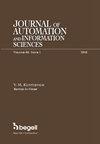时滞分布式系统的随机微分对策
Q3 Engineering
Journal of Automation and Information Sciences
Pub Date : 2021-01-01
DOI:10.34229/0572-2691-2021-1-4
引用次数: 0
摘要
研究了一类时滞随机系统的微分对策。系统的演化用Ito在Hilbert空间中的线性随机微分方程来描述。假设所考虑的希尔伯特空间是实数且可分离的。维纳过程取希尔伯特空间中的值,并具有核对称正协方差算子。追逐者和逃避者控制是非预期的随机过程,通常在不同的希尔伯特空间中取值。系统状态的算子乘法是解析半群的生成。方程的解由初始数据和控制块的常数变分公式表示。延时效应是通过对移位型算子求和来考虑的。为了研究微分对策,将求解函数的方法推广到Hilbert空间中的时滞随机系统。使用集值映射及其选择器的技术。我们考虑将抽象Hilbert空间中得到的结果应用于具有时滞的随机偏微分方程所描述的系统。在考虑随机外部影响和时间延迟的情况下,研究了受控分布热源和泄漏的热传播过程。本文章由计算机程序翻译,如有差异,请以英文原文为准。
STOCHASTIC DIFFERENTIAL GAMES IN DISTRIBUTED SYSTEMS WITH DELAY
We study a differential game of approach in a delay stochastic system. The evolution of the system is described by Ito`s linear stochastic differential equation in Hilbert space. The considered Hilbert spaces are assumed to be real and separable. The Wiener process takes values in a Hilbert space and has a nuclear symmetric positive covariance operator. The pursuer and evader controls are non-anticipating random processes, taking on values, generally, in different Hilbert spaces. The operator multiplying the system state is the generator of an analytic semigroup. Solutions of the equation are represented with the help of a formula of variation of constants by the initial data and the control block. The delay effect is taken into account by summing shift type operators. To study the differential game, the method of resolving functions is extended to case of delay stochastic systems in Hilbert spaces. The technique of set-valued mappings and their selectors is used. We consider the application of obtained results in abstract Hilbert spaces to systems described by stochastic partial differential equations with time delay. By taking into account a random external influence and time delay, we study the heat propagation process with controlled distributed heat source and leak.
求助全文
通过发布文献求助,成功后即可免费获取论文全文。
去求助
来源期刊

Journal of Automation and Information Sciences
AUTOMATION & CONTROL SYSTEMS-
自引率
0.00%
发文量
0
审稿时长
6-12 weeks
期刊介绍:
This journal contains translations of papers from the Russian-language bimonthly "Mezhdunarodnyi nauchno-tekhnicheskiy zhurnal "Problemy upravleniya i informatiki". Subjects covered include information sciences such as pattern recognition, forecasting, identification and evaluation of complex systems, information security, fault diagnosis and reliability. In addition, the journal also deals with such automation subjects as adaptive, stochastic and optimal control, control and identification under uncertainty, robotics, and applications of user-friendly computers in management of economic, industrial, biological, and medical systems. The Journal of Automation and Information Sciences will appeal to professionals in control systems, communications, computers, engineering in biology and medicine, instrumentation and measurement, and those interested in the social implications of technology.
 求助内容:
求助内容: 应助结果提醒方式:
应助结果提醒方式:


